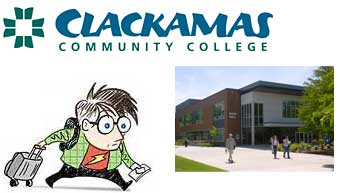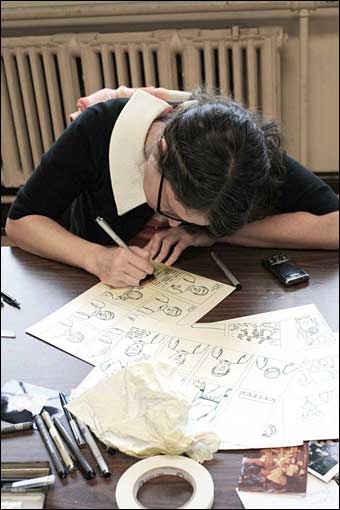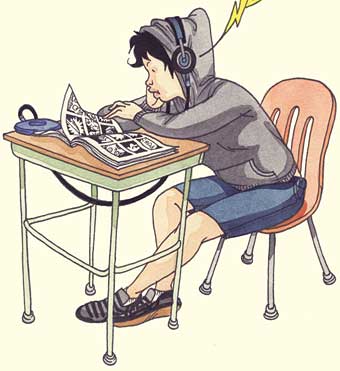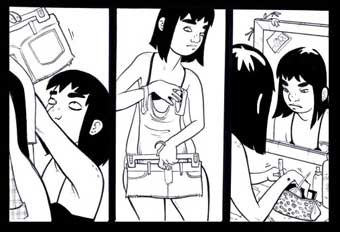Technical Difficulties…
Having some problems uploading new images this morning for the post I was planning, so instead, I might as well link to this curiosity: a rare video of me that doesn’t make me cringe (filmed at last year’s Barcelona convention).
Or, As We Say in Sweden…
Got an email the other day from a consultant named Ben Sauer, wondering what I thought of Flattr. He’d even Googled “Scott McCloud Flattr” with no luck.
If he was surprised that I’ve kept my mouth shut this long, I can’t blame him. I’m a little surprised myself.
Flattr is a “social micropayment” (or, if you like, micro-donation) system that gives users the option of donating a lump sum each month that can then be proportionally distributed among content creators that the user visits.
The amount is up to the user and can be as little as a few bucks.
It’s not a bad idea on the face of it, and it’s getting a little extra attention because of the involvement of Pirate Bay co-founder Peter Sunde.
These days, when micropayments come up, I tend to stay on the sidelines. I’m enough of a poster boy for what didn’t (couldn’t?) work in 2005, that I doubt any favorable attention from me is going to do anyone any good.
But the Pirate Bay connection is an interesting one, because it highlights the fact that what we think of as paid content markets are, on some level, becoming de facto donation communities for those of us who could get content elsewhere for nothing, but just decide not to.
“Willing sellers and willing buyers” was the phrase I kept coming back to. Even in 2005, I wasn’t interested in unbreakable paywalls or DRM, I believed that if there was a simple way for users to pay a little for the content they liked, enough people would do so to keep comics afloat without the need for coercion.
I was marked down as wrong in 2005, and there’s no guarantee that the makers of Flattr won’t suffer the same fate, but I’m glad somebody out there is still trying.
If closed systems like app stores and dedicated devices wind up putting paid content back into the driver’s seat, a lot of comics pros and the companies they work for might have reason to celebrate, but a community-based solution would make me a lot happier.
Does Flattr look like a community-based solution any of you would want to support?
Forever Catching Up: Ulli Lust
Yet another interesting artist I’m just now catching up to…
Parts 1-4 of German cartoonist Ulli Lust’s travelogue comic “Today is the Last Day of the Rest of Your Life” is available in English as a PDF download here and here. It has a warmth and playfulness I like.
Last month, TCJ ran an article by Matthias Wivel on Lust and her recent collection (w/second color) of the comic in German. Let’s hope someone puts out a similar English edition soon.
And, because I’m a format nerd, I just want to point out how well formatted Lust’s screen-fitting PDF’s are. Go full screen for a seamless click through.
…and Oregon City!
Off to Oregon City shortly for Friday evening’s kick-off talk at the Clackamas CC 24-Hour Story Jam!
[Edit to Add: If that link goes to the wrong place, know that my hosts tell me it’ll be at 6:30 pm at Niemeyer Center]
Back home and to regular blogging Monday. Have a great week(end)!
The Day in Review
Two more 24-Hour Comics Day links to consider, now that this year’s event is in the rear-view mirror.
Sean Michael Robinson offers a thoughtful look at the phenomenon, his own experience in Seattle, and improvisation in comics here.
Pay special attention to the paragraph on our daily impediments to focus and see if you can’t relate. “Iron swimsuit” indeed…
Meanwhile, the video (from 2008) in this blog entry about 24-Hour Comics Day in Amsterdam, just made me smile from ear to ear.
You don’t need to know Dutch to recognize the language of creativity, camaraderie, and comics. Wish I could have been there.
Two More to Watch Out For
Two more artists coming onto the radar this week: Hellen Jo and Liz Suburbia.
Hellen Jo has a great-looking piece at Jordan Crane’s What Things Do which might not be new, but it’s new to me, so it might be to you.
Hellen Jo’s artwork is all pretty new to me actually. Haven’t read a lot yet, but I like what I’ve seen. (link via Tom)
Meanwhile, Liz Suburbia has a cool comic running on both her LJ and at her new site.
According to Wood on Friday’s comment thread, I linked to a page of Liz’s several years ago but her stuff has grown by leaps and bounds since then.
Again, because time is short this week, I’ve just begun to read it all, but I like what I’ve seen so far.
Not sure why I’m lumping these two together, except that they’re both relatively new to me, both good, and both of them draw in a way that vaguely reminds me of Brandon Graham for some reason.
Also there’s a lot of great new talent out there and once in a while, I have to double up.
[Edit to Add: Stupid me, there’s actually a date on Hellen’s piece. 2008]
Portraits, Pop-Ups, Prognosticators, and a Proof of Concept
Well it turns out that if you want to make a photocomic, being a great photographer doesn’t hurt. Who knew?
Seth Kushner’s Culture Pop (not to be confused with CulturePulp by Mike Russell) features photocomics of real life characters. Click on the chapter numbers to surf from person to person. It’s pretty cool.
This being Friday, a few odds and ends:
A couple of cool not-comics books in the mailbox this week. I’ve just started diving into Kevin Kelly’s new book What Technology Wants but it’s a fascinating read already. And Andrew Farago’s first book is out, a handsome new Loony Tunes Treasury, with all sorts of fun sproingy extras in it.
Finally, Mike Leung offers a little proof-of-concept experiment mixing words and pictures:
“An adaptation of Swift’s Modest Proposal that gives the reader control of the story progress via common-sense scrolling, can be as light as you can make your image files. and needs no commercial tools to publish other than what it takes to post digitize artwork online.”
Have a great weekend!
Are You Reading The Meek?
(Not safe for work if you start from the beginning, but nothing too extreme).
Sick Day
Enjoying a visit from Mr. Kidney Stone this morning.
A short visit, I hope.























